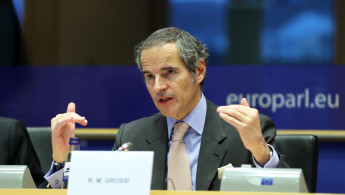UN nuclear watchdog raises alarms over Iran's covert centrifuge changes
The UN nuclear watchdog said Wednesday that Iran had substantially modified an interconnection between two centrifuge clusters enriching uranium to up to 60 percent at its Fordow Fuel Enrichment Plant (FFEP), without declaring it to the agency.
During an unannounced inspection at the Fordow plant on January 21, the International Atomic Energy Agency detected that "two IR-6 centrifuge cascades... were interconnected in a way that was substantially different from the mode of operation declared by Iran to the agency", according to a confidential report seen by AFP.
Since late last year the two centrifuge cascades have been used to produce uranium enriched to up to 60 percent, the report to member states added.
After the IAEA carried out the inspection at Fordow, Iran "subsequently informed the Agency that it had switched to this mode of operation on 16 January".
The agency did not specify what kind of changes were made to the interconnection between the centrifuge cascades.
But IAEA head Rafael Grossi expressed concern that Iran had "implemented a substantial change in the design information of FFEP in relation to the production of high enriched uranium without informing the Agency in advance".
"This is inconsistent with Iran's obligations under its Safeguards Agreement and undermines the Agency's ability to adjust the safeguards approach for FFEP and implement effective safeguards measures at this facility," he said in a statement.
Last week, Grossi told lawmakers in the European Parliament that Iran had "amassed enough nuclear material for several nuclear weapons - not one at this point".
Speaking about Iran's recent atomic activities, including enriching uranium toward a level needed for nuclear weapons - well beyond the limits of the landmark 2015 deal curbing Iran's nuclear capabilities - Grossi said the trajectory Iran was on "is certainly not a good one".
The agreement, known as the JCPOA, fell apart after the US withdrew in 2018 under former president Donald Trump, and negotiations to revive it have since stalled.





 Follow the Middle East's top stories in English at The New Arab on Google News
Follow the Middle East's top stories in English at The New Arab on Google News


